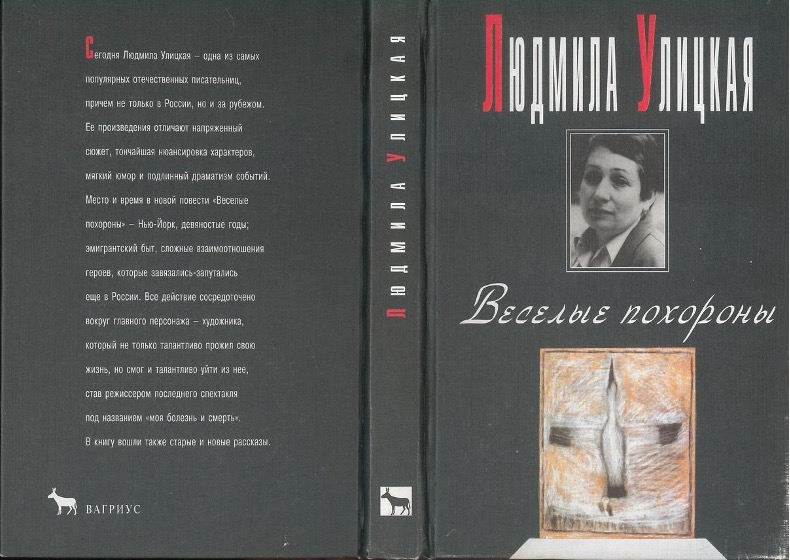Filed Under: Print > Literature > The Black Series from Vagrius
The Black Series from Vagrius

Ludmila Ulitskaya’s novel The Funeral Party (Veselye pokhorony), in the Black Series by Vagrius (1998)
Vagrius, one of the most successful publishers of the 1990s, was launched in 1992 when three friends with literary backgrounds and capitalist ambitions decided to make a foray into the booming book business. The three founders—Oleg Vasiliev, Vladimir Grigoriev, and Gleb Uspenskii—combined the first syllables of their last names to form the house’s vaguely Latinate and intentionally obscure name. The press’s logo, a donkey, was a winking homage to Christ’s humble entry into Jerusalem transformed into the riches of the Vatican.
Larisa Vasilieva, wife of Oleg Vasiliev, came up with the idea when she recalled “an old Jewish joke: A huge crowd at the Vatican. The pope comes out in a huge, luxurious limousine, escorted by an entourage of motorcycles. An impressive sight. Two poor Jews are in the crowd. One says to the other: ‘And it all started with a little donkey.’ So I said, ‘Same goes for you. Start with a little donkey.’” The press’s logo was not Vasilieva’s only contribution to Vagrius, however: She was also the author of its first bestseller, Kremlin Wives, which spent several weeks on the Knizhnoe obozrenie bestseller lists in 1993 and 1994.
Typically for the masculinist world or post-Soviet entrepreneurship, though, she was never counted among the founders. In its first years, Vagrius was a respectable, but not necessarily outstanding, member of the new publishing world. But by the mid-1990s, its adoption and adaptation of the book series format propelled it to new prominence. The book series had become a major way for publishers to stand out in a crowded field as all-but-indistinguishable romance novels, thrillers, and detective novels (detektivy) flooded the marketplace. Vagrius participated in this pulp bonanza with successful entries like “What is Concealed Will be Revealed” (Tainое stanovitsia iavnym), a series of detective novels and non-fiction offerings on historical mysteries, and “Women’s Handwriting” (Zhenskii pocherk), which published novels by women from Iris Murdoch to Svetlana Vasilenko.
Vagrius’s innovation was to make “real” literature and nonfiction look (and sell!) like pulpier offerings. For example, the series “My Twentieth Century” (Moi XX vek) collected memoirs by Russian and international literary and artistic figures from Lev Trotsky to Virginia Woolf under a single cover design. Many of these volumes made it onto bestseller lists. Yet Vagrius’s greatest success in bringing high culture to the masses was the collection “Contemporary Russian Prose,” known for its distinctive covers simply as the “Black Series.”
Beginning in 1996, Vagrius brought out almost fifty volumes of some of the best Russian (and soon international) prose of the time. The list, curated in large part by editor Elena Shubina, included Vladimir Makanin, Andrei Bitov, Ludmila Ulitskaya (pictured above), Ludmila Petrushevskaya, and many of the best works of Victor Pelevin. Writing in 2000, author Olga Slavnikova—who herself emerged as a major literary force in the post-Soviet 1990s—described the advent of this series as nothing short of “revolutionary.” Not only did “non-commercial prose” begin to “appear in well-formatted editions,” it also “took over the market” so that, “for a long time, all one saw was the ‘Black Series.’”
Larisa Vasilieva, wife of Oleg Vasiliev, came up with the idea when she recalled “an old Jewish joke: A huge crowd at the Vatican. The pope comes out in a huge, luxurious limousine, escorted by an entourage of motorcycles. An impressive sight. Two poor Jews are in the crowd. One says to the other: ‘And it all started with a little donkey.’ So I said, ‘Same goes for you. Start with a little donkey.’” The press’s logo was not Vasilieva’s only contribution to Vagrius, however: She was also the author of its first bestseller, Kremlin Wives, which spent several weeks on the Knizhnoe obozrenie bestseller lists in 1993 and 1994.
Typically for the masculinist world or post-Soviet entrepreneurship, though, she was never counted among the founders. In its first years, Vagrius was a respectable, but not necessarily outstanding, member of the new publishing world. But by the mid-1990s, its adoption and adaptation of the book series format propelled it to new prominence. The book series had become a major way for publishers to stand out in a crowded field as all-but-indistinguishable romance novels, thrillers, and detective novels (detektivy) flooded the marketplace. Vagrius participated in this pulp bonanza with successful entries like “What is Concealed Will be Revealed” (Tainое stanovitsia iavnym), a series of detective novels and non-fiction offerings on historical mysteries, and “Women’s Handwriting” (Zhenskii pocherk), which published novels by women from Iris Murdoch to Svetlana Vasilenko.
Vagrius’s innovation was to make “real” literature and nonfiction look (and sell!) like pulpier offerings. For example, the series “My Twentieth Century” (Moi XX vek) collected memoirs by Russian and international literary and artistic figures from Lev Trotsky to Virginia Woolf under a single cover design. Many of these volumes made it onto bestseller lists. Yet Vagrius’s greatest success in bringing high culture to the masses was the collection “Contemporary Russian Prose,” known for its distinctive covers simply as the “Black Series.”
Beginning in 1996, Vagrius brought out almost fifty volumes of some of the best Russian (and soon international) prose of the time. The list, curated in large part by editor Elena Shubina, included Vladimir Makanin, Andrei Bitov, Ludmila Ulitskaya (pictured above), Ludmila Petrushevskaya, and many of the best works of Victor Pelevin. Writing in 2000, author Olga Slavnikova—who herself emerged as a major literary force in the post-Soviet 1990s—described the advent of this series as nothing short of “revolutionary.” Not only did “non-commercial prose” begin to “appear in well-formatted editions,” it also “took over the market” so that, “for a long time, all one saw was the ‘Black Series.’”